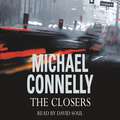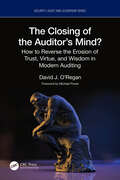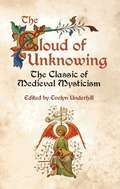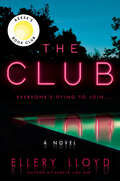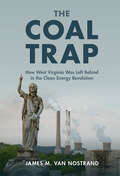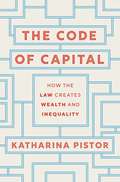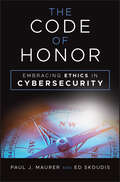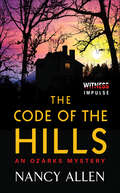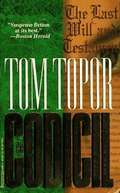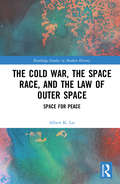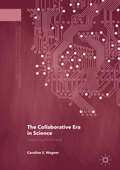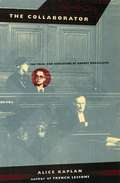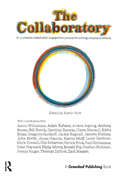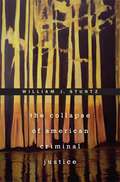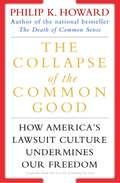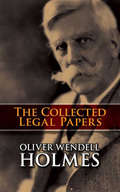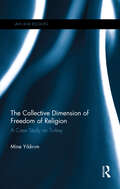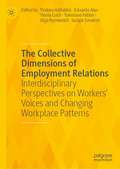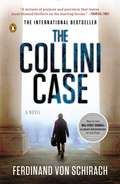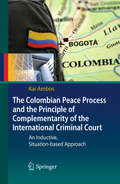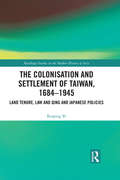- Table View
- List View
The Closers (Harry Bosch Series #11)
by Michael ConnellyHarry is back, assigned to the LAPD's Open-Unsolved Unit with his former cop ally and partner, Kizmin Rider. These detectives are the Closers. They are thrown into a politically sensitive and dangerous case when a white supremacist is connected to the 1988 murder of a mixed race girl. The police department has changed, but one thing hasn't - Harry's nemesis, Irving. The former Deputy Chief has been pushed from power and given a virtually meaningless new role. Full of vengeance, Irving calls Harry a 'retread'. He watches from the sidelines like an injured bear, hoping Harry will make a mistake . . .Read by David Soul(p) 2005 Orion Publishing Group
The Closing of the Auditor’s Mind?: How to Reverse the Erosion of Trust, Virtue, and Wisdom in Modern Auditing (Security, Audit and Leadership Series)
by David J. O'ReganIn The Closing of the Auditor’s Mind?, author David J. O’Regan describes internal auditing as an important "binding agent" of social cohesion, for the accountability of individuals and organizations and also at aggregated levels of social trust. However, O’Regan also reveals that internal auditing faces two severe challenges – an external challenge of adaptation and an internal challenge of fundamental reform.The adaptation challenge arises from ongoing, paradigmatic shifts in accountability and social trust. The command- and- control, vertical hierarchies of traditional bureaucracies are being replaced in importance by networked, flattened patterns of accountability. The most challenging assurance demands of the modern era are increasingly located in three institutional domains – in the inner workings of organizations; in intermediary spaces at organizational boundaries; and in extra-mural locations. Internal auditing continues to cling, barnacle- like, to the inner workings of traditional, bureaucratic structures, and it has little to offer the emerging assurance demands on or beyond institutional boundaries. The reform challenge arises from internal auditing’s prevailing tendency toward a rigid, algorithmic, checklist mindset that suppresses practitioners’ creativity and critical thinking. This trend is increasingly narrowing internal auditing’s intellectual and moral horizons. Under the pressures of these challenges, internal auditing is struggling to fulfil its primary purpose of serving the public interest.O’Regan’s powerful book focuses on: The redistribution of social trust from traditional, hierarchical institutions to diffuse, horizontally distributed networks The perennial validity of the classical virtues as the humane foundation of professional activity The role of creative expertise in promoting professional wisdom The Closing of the Auditor’s Mind? is a philosophical audit of a profession on the threshold of crisis. The book presupposes no prior knowledge of philosophy, nor indeed of auditing. Philosophical technicalities are contained in an Appendix, leaving the main text jargon-free. O’Regan provides original and striking perspectives on the malaise of modern internal auditing, and he proposes radical remedies. This captivating and well-informed book is a must-read for all who are concerned with our collective socio-economic and political well-being.
The Cloud of Unknowing: The Classic of Medieval Mysticism
by Evelyn UnderhillAn exploration of the nature of reality, mysticism begins with the individual struggle toward a clear vision and culminates in a transformed consciousness. This marvelous guide to the contemplative life originated with the reflection of an unknown fourteenth-century priest who believed that a "cloud of unknowing" separates people from God. This cloud, he maintained, cannot be penetrated by intellect —only by love.The Cloud of Unknowing offers an approach to contemplative life that finds holiness at a level deeper than physical experience and beyond language or image. The author advises placing all thought and mental imagery behind a metaphorical "cloud of forgetting" while seeking to love the divine. Hidden from the infinite consciousness by a "cloud of unknowing," divine love can be reached through monologistic prayer — a single-word prayer, like a mantra, that assists in abandoning all extraneous thought. Seekers can thus attain an inner silence, where they may "be still and know the sacred."The author's spiritual gifts, combined with his humorous and straightforward approach, offer a view of divinity that never loses the common touch. Written in everyday language and edited by a popular authority on mysticism, this venerable work can be understood and appreciated by any reader.
The Club: A Novel
by Ellery LloydA REESE'S BOOK CLUB PICKINSTANT NEW YORK TIMES BESTSELLER“Are you ready for the roller coaster ride that is The Club? . . . A beautifully written, densely plotted murder mystery that takes place at a private club off the coast of England. Read about a luxurious, celeb-only island during a weekend of partying and ultimately murder.” —Reese Witherspoon (Reese’s Book Club March ’22 Pick)From the author of People Like Her comes a smart and sinister murder mystery set in the secretive world of exclusive celebrity clubs.Everyone's Dying to Join . . . The Home Group is a glamorous collection of celebrity members' clubs dotted across the globe, where the rich and famous can party hard and then crash out in its five-star suites, far from the prying eyes of fans and the media.The most spectacular of all is Island Home—a closely-guarded, ultraluxurious resort, just off the English coast—and its three-day launch party is easily the most coveted A-list invite of the decade.But behind the scenes, tensions are at breaking point: the ambitious and expensive project has pushed the Home Group's CEO and his long-suffering team to their absolute limits. All of them have something to hide—and that's before the beautiful people with their own ugly secrets even set foot on the island. As tempers fray and behavior worsens, as things get more sinister by the hour and the body count piles up, some of Island Home’s members will begin to wish they’d never made the guest list.Because at this club, if your name’s on the list, you’re not getting out.
The Coal Trap: How West Virginia Was Left Behind in the Clean Energy Revolution
by James M. Van NostrandBetween 2009 and 2019, West Virginian politicians aligned themselves with the interests of the coal industry to the substantial detriment of the citizens and economy of the state. Despite the undeniable low-carbon transformation that was occurring in the energy industry in the US during this period, state political leaders doubled down on coal. Rather than provide the leadership necessary to manage the transition of the state's economic drivers away from fossil fuels, they largely blamed the demise of the coal industry on the federal government. At every turn, the interests of the coal industry were placed above the economic and environmental health of West Virginians. James Van Nostrand tells the story of why West Virginia now faces overwhelming obstacles to competing in the economic marketplace of the twenty-first century. The book serves as a warning of how a fair energy transition can be derailed by political failure.
The Code Of Criminal Procedure 1973
by J. P. Arjun P. Jaganathan Usha JaganathanThe Code of Criminal Procedure, 1973 is a comprehensive guide that outlines the procedural framework for the administration of criminal justice in India. This updated volume from the Usha Jaganath Law Series includes section-wise explanations in simple, exam-oriented language, incorporating important amendments from 2005, 2008, and 2013. It extensively covers the roles and powers of courts, police procedures, rights of the accused, trial processes, appeals, bails, and other key procedural aspects. The book also integrates the Juvenile Justice (Care and Protection of Children) Act, 2015 and the Probation of Offenders Act, 1958, offering a holistic view of reformative and rehabilitative justice. With added model questions, short notes, solved problems, and references to landmark case laws, the book is tailored to meet the needs of law students and budding advocates. It emphasizes clarity, academic relevance, and practical application, making it a valuable resource for legal education and practice in criminal law.
The Code of Capital: How the Law Creates Wealth and Inequality
by Katharina PistorA compelling explanation of how the law shapes the distribution of wealthCapital is the defining feature of modern economies, yet most people have no idea where it actually comes from. What is it, exactly, that transforms mere wealth into an asset that automatically creates more wealth? The Code of Capital explains how capital is created behind closed doors in the offices of private attorneys, and why this little-known fact is one of the biggest reasons for the widening wealth gap between the holders of capital and everybody else.In this revealing book, Katharina Pistor argues that the law selectively “codes” certain assets, endowing them with the capacity to protect and produce private wealth. With the right legal coding, any object, claim, or idea can be turned into capital—and lawyers are the keepers of the code. Pistor describes how they pick and choose among different legal systems and legal devices for the ones that best serve their clients’ needs, and how techniques that were first perfected centuries ago to code landholdings as capital are being used today to code stocks, bonds, ideas, and even expectations—assets that exist only in law.A powerful new way of thinking about one of the most pernicious problems of our time, The Code of Capital explores the different ways that debt, complex financial products, and other assets are coded to give financial advantage to their holders. This provocative book paints a troubling portrait of the pervasive global nature of the code, the people who shape it, and the governments that enforce it.
The Code of Honor: Embracing Ethics in Cybersecurity
by Paul J. Maurer Ed SkoudisA comprehensive and practical framework for ethical practices in contemporary cybersecurity While some professions – including medicine, law, and engineering – have wholeheartedly embraced wide-ranging codes of ethics and conduct, the field of cybersecurity continues to lack an overarching ethical standard. This vacuum constitutes a significant threat to the safety of consumers and businesses around the world, slows commerce, and delays innovation. The Code of Honor: Embracing Ethics in Cybersecurity delivers a first of its kind comprehensive discussion of the ethical challenges that face contemporary information security workers, managers, and executives. Authors Ed Skoudis, President of the SANS Technology Institute College and founder of the Counter Hack team, and Dr. Paul Maurer, President of Montreat College, explain how timeless ethical wisdom gives birth to the Cybersecurity Code which is currently being adopted by security practitioners and leaders around the world. This practical book tells numerous engaging stories that highlight ethically complex situations many cybersecurity and tech professionals commonly encounter. It also contains compelling real-world case studies – called Critical Applications – at the end of each chapter that help the reader determine how to apply the hands-on skills described in the book. You'll also find: A complete system of cybersecurity ethics relevant to C-suite leaders and executives, front-line cybersecurity practitioners, and students preparing for careers in cybersecurity. Carefully crafted frameworks for ethical decision-making in cybersecurity. Timeless principles based on those adopted in countless professions, creeds, and civilizations. Perfect for security leaders, operations center analysts, incident responders, threat hunters, forensics personnel, and penetration testers, The Code of Honor is an up-to-date and engaging read about the ethically challenging world of modern cybersecurity that will earn a place in the libraries of aspiring and practicing professionals and leaders who deal with tech every day.
The Code of the Hills: An Ozarks Mystery (Ozarks Mysteries)
by Nancy AllenTo uncover the truth, she'll have to break the code of the hills …In the Missouri Ozarks, some things aren't talked about … even abuse. But prosecutor Elsie Arnold is determined to change that.When she is assigned to prosecute a high-profile incest case in which a father is accused of abusing his three young daughters, Elsie is ready to become the Ozarks' avenging angel.But as Elsie sinks her teeth into the case, everything begins to turn sour. The star witness goes missing; the girls refuse to talk about their father, who terrorizes the courtroom from the moment he enters; and Elsie begins to suspect that their tough-as-nails mother has ulterior motives. To make matters worse, Elsie receives gruesome threats from local extremists, warning her to mind her own business.While Elsie swears not to let a sex offender walk, she realizes the odds—and maybe the town—are against her, and her life begins to crumble. But amidst all of the conflict, the safety of three young girls hangs in the balance ...A powerful debut, with the haunting atmosphere of Winter's Bone and the page-turning suspense of Alafair Burke's thrillers.
The Codicil
by Tom ToporRenegade private detective Adam Bruno wonders how he-the street-smart son of a bookie-has come to be chosen by the aristocratic family to find the missing heir. Is the truth that they are counting on him to fail-so that they can keep the inheritance? Bruno's investigation runs him smack up against the dead man's complex facade of secrets and deception. But as the secrets start to unravel, the witnesses turn up dead-and Bruno must race against time, and an unknown nemesis, to solve the secret and find the missing child, before his hidden enemy finds him.
The Cold War and the Income Tax: A Protest
by Edmund WilsonThe truth is that the people of the United States are at the present time dominated and driven by two kinds of officially propagated fear: fear of the Soviet Union and fear of the income tax. These two terrors have been adjusted so as to complement one another and thus to keep the citizen of our free society under the strain of a double pressure; from which he finds himself unable to escape -- like the man in the old Western story, who, chased into a narrow ravine by a buffalo, is confronted with a grizzly bear. If we fail to accept the tax, the Russian buffalo will butt and trample us, and if we try to defy the tax, the federal bear will crush us. The 60,000 officials who are appointed to check on us taxpayers are checked on, themselves, it seems, by another group of agents set to watch them. And supplementing these officials -- since private citizens are paid by the Internal Revenue Service to report on other people's delinquencies, and their names of course are never revealed -- there is a whole host of amateur investigators... Does this kind of spying and delegation differ much in its incitement to treachery from that which is encouraged in the Soviet Union?
The Cold War, the Space Race, and the Law of Outer Space: Space for Peace (Routledge Studies in Modern History)
by Albert K. LaiThe Cold War, the Space Race, and the Law of Outer Space: Space for Peace tells the story of one of the United Nations’ most enduring and least known achievements: the adoption of five multilateral treaties that compose the international law of outer space. The story begins in 1957 during the International Geophysical Year, the largest ever cooperative scientific endeavor that resulted in the launch of Sputnik. Although satellites were first launched under the auspices of peaceful scientific cooperation, the potentially world-ending implications of satellites and the rockets that carried them was obvious to all. By the 1960s, the world faced the prospect of nuclear testing in outer space, the placement of weapons of mass destruction in orbit, and the militarization of the moon. This book tells the story of how the United Nations tried to seize the promise of peace through scientific cooperation and to ward off the potential for war in the Space Age through the adoption of the Outer Space Treaty, the Rescue and Return Agreement, the Liability Convention, the Registration Convention, and the Moon Agreement. Interdisciplinary in approach, the book will be of interest to scholars in law, history and other fields who are interested in the Cold War, the Space Race, and outer space law.
The Collaborative Era in Science: Governing The Network (Palgrave Advances In The Economics Of Innovation And Technology Ser.)
by Caroline S. WagnerIn recent years a global network of science has emerged as a result of thousands of individual scientists seeking to collaborate with colleagues around the world, creating a network which rises above national systems. The globalization of science is part of the underlying shift in knowledge creation generally: the collaborative era in science. Over the past decade, the growth in the amount of knowledge and the speed at which it is available has created a fundamental shift—where data, information, and knowledge were once scarce resources, they are now abundantly available. Collaboration, openness, customer- or problem-focused research and development, altruism, and reciprocity are notable features of abundance, and they create challenges that economists have not yet studied. This book defines the collaborative era, describes how it came to be, reveals its internal dynamics, and demonstrates how real-world practitioners are changing to take advantage of it. Most importantly, the book lays out a guide for policymakers and entrepreneurs as they shift perspectives to take advantage of the collaborative era in order to create social and economic welfare.
The Collaborator: The Trial & Execution of Robert Brasillach
by Alice KaplanOn February 6, 1945, Robert Brasillach was executed for treason by a French firing squad. He was a writer of some distinction—a prolific novelist and a keen literary critic. He was also a dedicated anti-Semite, an acerbic opponent of French democracy, and editor in chief of the fascist weekly Je Suis Partout, in whose pages he regularly printed wartime denunciations of Jews and resistance activists. Was Brasillach in fact guilty of treason? Was he condemned for his denunciations of the resistance, or singled out as a suspected homosexual? Was it right that he was executed when others, who were directly responsible for the murder of thousands, were set free? Kaplan's meticulous reconstruction of Brasillach's life and trial skirts none of these ethical subtleties: a detective story, a cautionary tale, and a meditation on the disturbing workings of justice and memory, The Collaborator will stand as the definitive account of Brasillach's crime and punishment. A National Book Award Finalist A National Book Critics Circle Award Finalist "A well-researched and vivid account. "—John Weightman, New York Review of Books "A gripping reconstruction of [Brasillach's] trial. "—The New Yorker "Readers of this disturbing book will want to find moral touchstones of their own. They're going to need them. This is one of the few works on Nazism that forces us to experience how complex the situation really was, and answers won't come easily. "—Daniel Blue, San Francisco Chronicle Book Review "The Collaborator is one of the best-written, most absorbing pieces of literary history in years. "—David A. Bell, New York Times Book Review "Alice Kaplan's clear-headed study of the case of Robert Brasillach in France has a good deal of current-day relevance. . . . Kaplan's fine book . . . shows that the passage of time illuminates different understandings, and she leaves it to us to reflect on which understanding is better. "—Richard Bernstein, The New York Times
The Collaboratory: A Co-creative Stakeholder Engagement Process for Solving Complex Problems
by Adam Kahane John North Paul Shrivastava Zaid Hassan Stephen Hickman Peter Hayward Ronald Fry Philip Mirvis Eddie Blass Claire Maxwell Katrin Muff Aaron Williamson Anders Aspling Anthony Buono Bill Burck Caroline Rennie Gregoire Serikoff Jackie Bagnall Janette Blainey Jonas Haertle Louie Gardiner Mark Drewell Otto Scharmer Patrick Frick Svenja Rüger Thomas DyllickThe introduction is free to download here.This book is about empowering ordinary people to make a difference in the world. It explores the transformation that emerges when groups spread around the world working on similar issues discover synchronicities, often cross-pollinating, and collaborate rather than compete. A Collaboratory is a facilitated space where stakeholders meet to discuss burning societal issues. Each collaboratory is different and needs to be carefully designed to fit the context, ambition, purpose, stakeholders, culture, and space.Part 1 of the book sets the stage by explaining what a collaboratory is, where it emerges from, how it is defined and how it fits into the larger context of the social lab revolution that is happening all over the world.Part 2 of the book unpacks the many dimensions and considerations that contribute to the magic of a collaboratory experience. We offer nine unique insights and perspectives that need to be considered and form an integral part of a successful collaboratory.Part 3 offers eight inspiring examples of how a collaboratory could be applied. We look at applications in the educational field, within organizations, among institutions, and as movements.Part 4 offers a pragmatic outlook on how to get started if you want to use the Collaboratory in your own field of work. The book offers a narrative roadmap using a real-life example of a co-designed and co-created Collaboratory in Norway.Offering practical recommendations and benefits, and bringing together insights from a range of experienced academics, practitioners and facilitators, The Collaboratory is a handbook for experienced or aspiring practitioners in all fields of change: in society, in organizations of all kind and in the field of education.
The Collapse of American Criminal Justice
by William J. StuntzRule of law has vanished in America's criminal justice system. Prosecutors decide whom to punish; most accused never face a jury; policing is inconsistent; plea bargaining is rampant; and draconian sentencing fills prisons with mostly minority defendants. A leading criminal law scholar looks to history for the roots of these problems - and solutions.
The Collapse of the Common Good: How America's Lawsuit Culture Undermines Our Freedom
by Philip K. HowardIn pursuit of fairness at any cost, we have created a society paralyzed by legal fear: Doctors are paranoid and principals powerless. Little league coaches, scared of liability, stop volunteering. Schools and hospitals start to crumble. The common good fades, replaced by a cacophony of people claiming their "individual rights. " By turns funny and infuriating, this startling book dissects the dogmas of fairness that allow self-interested individuals to bully the rest of society. Philip K. Howard explains how, trying to honor individual rights, we removed the authority needed to maintain a free society. Teachers don't even have authority to maintain order in the classroom. With no one in charge, the safe course is to avoid any possible risk. Seesaws and diving boards are removed. Ridiculous warning labels litter the American landscape: "Caution: Contents Are Hot. " Striving to protect "individual rights," we ended up losing much of our freedom. When almost any decision that someone disagrees with is a possible lawsuit, no one knows where he stands. A huge monument to the unknown plaintiff looms high above America, casting a dark shadow across our daily choices. Today, in the land of free speech, you'd have to be a fool to say what you really think. This provocative book not only attacks the sacred cows of political correctness, but takes a breathtakingly bold stand on how to reinvigorate our common good. Only by restoring personal authority can schools begin to work again. Only by judges and legislatures taking back the authority to decide who can sue for what can doctors feel comfortable using their best judgment and American be liberated to say and do what they know is right. Lucid, honest, and hard hitting, The Collapse of the Common Good shows how Americans can bring back freedom and common sense to a society disabled by lawyers and legal fear. From the Trade Paperback edition.
The Collected Legal Papers
by Oliver Wendell Holmes Jr.Oliver Wendell Holmes (1841–1935) is ingrained in American history as one of the country's foremost jurists. Distinguished for his learning, judgment, humor, and eloquence, he served as justice of the United States Supreme Court for four decades. Throughout his career, Holmes forged new concepts of the origin and nature of law. He viewed the law as a social instrument rather than as a set of abstract principles, and his ideas were seminal in the development of modern free-speech legislation. His retirement in 1932 was a national event, and he remains today one of the most influential members to have ever served on the Supreme Court.This volume compiles twenty-six of Oliver Wendell Holmes's legal papers and addresses, an important collection of opinions and dissents that touch every field of our national activity and reflect the ongoing development of a democratic society. Included is the famous article "Early English Equity," along with Holmes's essay on "The Path of the Law," which is regarded as the most significant index to his legal work.
The Collected Philosophical Papers of G.E.M. Anscombe: Ethics, Religion And Politics
by G. E. AnscombeAn essential collection of Anscombe's work on ethics and intention <p> Gertrude Elizabeth Margaret Anscombe is considered one of analytical philosophy's most prominent figures and a leader in the field of virtue ethics. Ethics, Religion, and Politics: Collected Philosophical Papers, Volume 3, is part of a multi-volume compilation of her work surrounding the philosophy of mind, philosophy of action, philosophy of language, philosophical logic, and ethics. This volume includes selected works relating to consequentialism, intention, and more, providing Ascombe scholars with a high-level view of her evolution of thought.
The Collective Dimension of Freedom of Religion: A Case Study on Turkey (Law and Religion)
by Mine YıldırımThe right to freedom of religion or belief, as enshrined in international human rights documents, is unique in its formulation in that it provides protection for the enjoyment of the rights "in community with others". This book explores the notion of the collective dimension of freedom of religion or belief with a view to advance the protection of this right. The book considers Turkey which provides a useful test case where both the domestic legislation can be assessed against international standards, while at the same time lessons can be drawn for the improvement of the standard of international review of the protection of the collective dimension of freedom of religion or belief. The book asks two main questions: what is the scope and nature of protection afforded to the collective dimension of freedom of religion or belief in international law, and, secondly, how does the protection of the collective dimension of freedom of religion or belief in Turkey compare and contrast to international standards? In doing so it seeks to identify how the standard of international review of the collective dimension of freedom of religion can be improved.
The Collective Dimensions of Employment Relations: Interdisciplinary Perspectives on Workers’ Voices and Changing Workplace Patterns
by Tindara Addabbo Edoardo Ales Ylenia Curzi Tommaso Fabbri Olga Rymkevich Iacopo SenatoriThis edited volume explores the old and new “collective dimensions” of employment relations. It examines specific challenges stemming from new forms of work of the digital and sharing economy, such as measurement, monitoring, assessment, and remuneration of work, the protection of work-life balance, the impact of new technologies on health and safety, the adaptation of occupational skills to new work processes, and the responses to the digital restructuring of undertakings. It addresses a series of questions such as how the representational action of unions and works councils can adapt to the challenges posed by new production systems and whether the legislative framework needs to be reformed to ensure that digital workers enjoy the right to collective representation. This important collection offers readers a renewed theoretical perspective and justification of the role that the dialogue between workers (representatives) and companies could play in an increasingly complex world of work.
The Collini Case
by Ferdinand Von SchirachThe internationally bestselling courtroom drama centering on a young German lawyer and a case involving World War II A bestseller in Germany since its 2011 release--with rights sold in seventeen countries--The Collini Case combines the classic courtroom procedural with modern European history in a legal thriller worthy of John Grisham and Scott Turow. Fabrizio Collini is recently retired. He's a quiet, unassuming man with no indications that he's capable of hurting anyone. And yet he brutally murders a prominent industrialist in one of Berlin's most exclusive hotels. Collini ends up in the charge of Caspar Leinen, a rookie defense lawyer eager to launch his career with a not-guilty verdict. Complications soon arise when Collini admits to the murder but refuses to give his motive, much less speak to anyone. As Leinen searches for clues he discovers a personal connection to the victim and unearths a terrible truth at the heart of Germany's legal system that stretches back to World War II. But how much is he willing to sacrifice to expose the truth?
The Colombian Peace Process and the Principle of Complementarity of the International Criminal Court
by Kai AmbosStriking a balance between peace and justice has long been debated by scholars and practitioners. There has been definite progress in a world in which blanket amnesties were at times granted with little hesitation. There is a growing understanding that accountability has both pragmatic and principled arguments in its favor. Practical arguments as much as shifts in norms have created a situation in which the choice is increasingly seen as "which forms of accountability" rather than a stark one between peace and justice. The Colombian Justice and Peace Law 975 and its implementation offer an interesting and unique approach to dealing with the international crimes committed in Colombia's decades-long armed conflict. Yet, will this approach suffice with regard to Colombia's obligations under international law to investigate and prosecute international crimes? Does it meet the standards of the ICC, which has been monitoring the Colombian situation for some time now? In particular, does it pass the complementarity test laid out in the ICC statute or will the ICC have to intervene in Colombia to enforce international criminal law?
The Colonial Construction of Indian Country: Native American Literatures and Federal Indian Law (Indigenous Americas)
by Eric CheyfitzA guide to the colonization and projected decolonization of Native America In The Colonial Construction of Indian Country, Eric Cheyfitz mounts a pointed historical critique of colonialism through careful analysis of the dialogue between Native American literatures and federal Indian law. Illuminating how these literatures indict colonial practices, he argues that if the decolonization of Indian country is to be achieved, then federal Indian law must be erased and replaced with independent Native nation sovereignty—because subordinate sovereignty, the historical regime, is not sovereignty at all. At the same time, Cheyfitz argues that Native American literatures, specifically U.S. American Indian literatures, cannot be fully understood without a knowledge of U.S. federal Indian law: the matrix of colonialism in Indian country. Providing intersectional readings of a range of literary and legal texts, he discusses such authors as Louise Erdrich, Frances Washburn, James Welch, Gerald Vizenor, Simon Ortiz, Leslie Marmon Silko, and others. Cheyfitz examines how American Indian writers and critics have responded to the impact of law on Native life, revealing recent trends in Native writing that build upon traditional modes of storytelling and governance. With a focus on resistance to the colonial regime of federal Indian law, The Colonial Construction of Indian Country not only elucidates how Native American literatures and federal Indian law are each crucial to any reading of the other, it also guides readers to better understand the genocidal assault on Indigenous peoples by Western structures of literacy, politics, and law.
The Colonisation and Settlement of Taiwan, 1684–1945: Land Tenure, Law and Qing and Japanese Policies (Routledge Studies in the Modern History of Asia)
by Ruiping YeThe dispossession of indigenous peoples by conquest regimes remains a pressing issue. This book, unlike most other books on the subject, contrasts two different colonial administrations – first the Chinese Qing Empire, then, from 1895, the Japanese. It shows how, under the Chinese legal system, the Qing employed the Chinese legal system to manage the relationship between the increasing numbers of Han Chinese settlers and the indigenous peoples, and how, although the Qing regime refrained from taking actions to transform aboriginal land tenure, nevertheless Chinese settlers were able to manipulate aboriginal land tenure to their advantage. It goes on to examine the very different approach of the Japanese colonial administration, which following the Meiji Restoration of 1868 had begun to adopt a Western legal framework, demonstrating how this was intentionally much more intrusive, and how the Japanese modernized legal framework significantly disrupted aboriginal land tenure. Based on extensive original research, the book provides important insights into colonisation, different legal traditions and the impact of colonial settlement on indigenous peoples.
